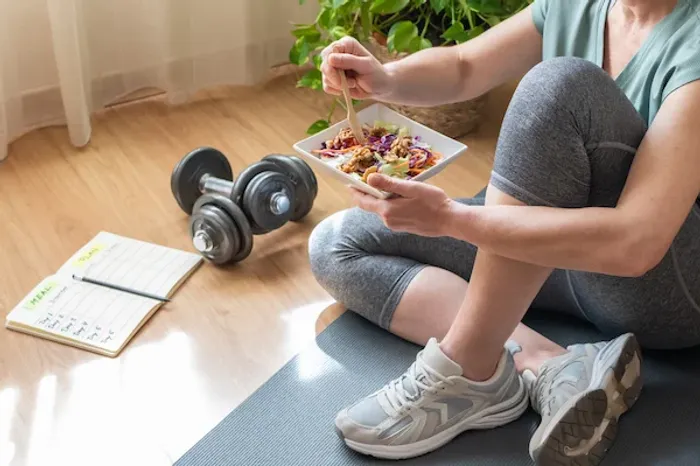Your 8-Step Guide to a Sustainable Healthy Lifestyle
Discover 8 practical steps to build a sustainable healthy lifestyle, including nutrition, exercise, habits, and wellness strategies for long-term well-being.

Written by Dr. Dhankecha Mayank Dineshbhai
Reviewed by Dr. Vasanthasree Nair MBBS
Last updated on 13th Jan, 2026

Introduction
Embarking on a journey toward a healthier you can feel overwhelming. With so much conflicting advice online, where do you even begin? The secret isn't found in a drastic, short-term diet or an exhausting fitness regime. True, lasting health is built on a foundation of consistent, manageable habits. This guide breaks down the path to wellness into 8 practical steps towards a healthy lifestyle. We'll move beyond the basics to explore not just what to do, but why it works and how you can make it stick for the long haul. Forget perfection; our focus is on progress. Whether you're looking to boost your energy, improve your mood, or simply feel better in your own skin, these steps will provide a clear, actionable roadmap tailored for everyday life. Let's dive in and build a healthier, happier you, one step at a time.
Step 1: Nourish Your Body with Whole Foods
The fuel you put into your body is the single most significant factor influencing your health. A balanced diet rich in whole foods provides the essential vitamins, minerals, and antioxidants needed for optimal function. Instead of thinking about restrictive dieting, shift your mindset to "crowding out" focus on adding more nutritious foods, and there will naturally be less room for the less beneficial ones.
The Plate Method: A Simple Guide to Balanced Meals
A powerful tool for nutrition without calorie counting is the Plate Method. Visualise your plate divided into sections:
Half the plate: Non-starchy vegetables (e.g., broccoli, spinach, peppers, carrots). These are low in calories and high in fiber and nutrients.
A quarter of the plate: Lean protein (e.g., chicken, fish, tofu, lentils). This supports muscle repair and keeps you feeling full.
A quarter of the plate: Complex carbohydrates (e.g., brown rice, quinoa, sweet potato). This provides sustained energy.
This method ensures a good balance of macronutrients in every meal, supporting stable blood sugar and long-lasting energy.
Foods to Embrace vs. Foods to Limit
Embrace: Colorful fruits and vegetables, whole grains, lean proteins, healthy fats (like avocados, nuts, and olive oil), and legumes.
Limit: Highly processed foods, sugary drinks, excessive refined carbohydrates (white bread, pastries), and trans fats. These can lead to inflammation, energy crashes, and long-term health issues.
Unique Insight: Don't forget about gut health! Incorporating fermented foods like yogurt, kefir, or kimchi can support a healthy gut microbiome, which is linked to improved digestion, immunity, and even mental health.
Health topic carousel:
Doctor's speciality: General Physician
Text: Consult a General Physician for the best advice
Step 2: Hydrate for Health and Energy
Water is involved in every bodily process, from regulating temperature to flushing out toxins. Even mild dehydration can cause fatigue, headaches, and poor concentration. A good general guideline is to drink 8-10 glasses (about 2-2.5 litres) of water per day, but your needs may vary with activity level and climate.
Pro Tip: Keep a water bottle on your desk or with you throughout the day as a constant reminder. If you find plain water boring, infuse it with slices of lemon, cucumber, mint, or berries for a flavor boost without added sugar. This is a simple yet profoundly effective step in your healthy lifestyle.
Step 3: Move Your Body in Ways You Enjoy
Physical activity is non-negotiable for health, but it doesn't have to mean gruelling gym sessions. The key is to find activities you genuinely enjoy, making you more likely to stick with them. Aim for at least 150 minutes of moderate-intensity exercise per week, as recommended by health authorities like the WHO.
Finding Your Fitness Groove: Cardio, Strength, and Flexibility
A well-rounded fitness routine includes:
Cardiovascular Exercise (e.g., brisk walking, cycling, swimming): Strengthens your heart and lungs.
Strength Training (e.g., bodyweight exercises, resistance bands, weights): Builds muscle, boosts metabolism, and supports bone health.
Flexibility and Balance (e.g., yoga, stretching): Improves mobility and reduces the risk of injury.
Unique Insight: Think outside the gym. Dancing in your living room, gardening, taking the stairs, or a walking meeting all count. The goal is to reduce sedentary time and move consistently throughout the day.
Step 4: Prioritise Quality Sleep for Recovery
Sleep is when your body repairs itself. Consistently getting 7-9 hours of quality sleep is crucial for cognitive function, mood regulation, immune health, and even weight management. Poor sleep hygiene is linked to an increased risk of chronic conditions.
To improve sleep, establish a regular sleep schedule (even on weekends), create a dark, cool, and quiet bedroom environment, and avoid screens for at least an hour before bed. The blue light from devices can suppress melatonin, the hormone that signals your body it's time to sleep.
Step 5: Master Your Stress Management
Chronic stress wreaks havoc on your body, contributing to high blood pressure, a weakened immune system, and anxiety. Effective stress reduction is a cornerstone of a healthy lifestyle.
Simple Techniques for Instant Calm
Incorporate small moments of calm into your day:
Mindfulness Meditation: Even 5-10 minutes a day can help center your thoughts.
Deep Breathing: The 4-7-8 technique (inhale for 4, hold for 7, exhale for 8) is a powerful tool to activate the parasympathetic nervous system.
Nature Time: A short walk in a park can significantly lower stress hormones.
If you find that stress is becoming unmanageable and affecting your daily life, consider speaking with a professional. You can consult a therapist or counsellor online with Apollo24|7 to develop personalised coping strategies.
Step 6: Build Deep Social Connections
Humans are social creatures. Strong, positive relationships are vital for our mental well-being. They provide support, reduce feelings of loneliness, and can even contribute to a longer life. Make time to nurture relationships with family and friends, whether through a regular phone call, a weekly coffee date, or joining a club or group with similar interests.
Step 7: Ditch Bad Habits and Build Healthy Ones
Habit formation is the engine of lasting change. Trying to change everything at once often leads to burnout. Instead, focus on one small habit at a time.
The Habit Loop: How to Make Change Stick
Every habit consists of a cue, a routine, and a reward. To build a new habit:
1. Cue: Make it obvious. (e.g., Place your running shoes next to your bed).
2. Routine: Make it easy. (e.g., Just commit to a 5-minute walk).
3. Reward: Make it satisfying. (e.g., Enjoy a delicious smoothie afterward).
This approach makes building a sustainable healthy lifestyle far more achievable than relying on willpower alone.
Step 8: Listen to Your Body and Get Regular Check-ups
Prevention is better than cure. Preventive care through regular health check-ups can catch potential issues early when they are most treatable. This includes dental check-ups, eye exams, and age-appropriate screenings.
The Role of Preventive Health Screenings
Screenings like blood pressure checks, cholesterol tests, and diabetes screening are essential. Apollo24|7 offers a convenient home collection for tests like vitamin D or HbA1c, making it easier than ever to stay on top of your health. Pay attention to your body's signals. If something feels off, don't ignore it.
Health topic carousel:
Lab Test: Cholesterol Test, Vitamin D Test, and HbA1c Test
Text: Get Your Health Assessed
Conclusion: Your Journey, Your Pace
Adopting a healthy lifestyle is a personal journey, not a destination. It's about progress, not perfection. You don't need to implement all 8 steps at once. Start with the one that feels most achievable for you right now. Maybe it's drinking more water this week or adding a 10-minute walk to your day. Small, consistent actions compound into remarkable results over time. Be patient and kind to yourself. This guide is your roadmap, refer back to it often, and remember that every positive choice you make is a step in the right direction. Your health is your greatest wealth; start investing in it today.
Frequently Asked Questions (FAQs)
Below are the FAQs:
1. I'm a beginner. What is the first step towards a healthy lifestyle?
A. Start small! Don't try to change everything. The most effective first step is often to increase your water intake or add one serving of vegetables to your dinner. Small wins build momentum and confidence.
2. How can I stay motivated to maintain these healthy habits?
A. Focus on how the habit makes you feel rather than just the outcome. Notice the energy boost after a walk or the better mood after a good night's sleep. Tracking your progress in a journal and celebrating small victories can also boost motivation.
3. Is it okay to have a "cheat day" on a healthy diet?
A. Instead of a "cheat day," which can lead to overindulgence, think in terms of balance. Allow yourself to enjoy your favorite foods in moderation without guilt. This prevents feelings of deprivation and makes your diet more sustainable.
4. I have a busy schedule. How can I find time to exercise?
A. Break it down! You don't need a full hour. Three 10-minute bouts of activity spread throughout the day (a brisk walk in the morning, at lunch, and after work) are just as beneficial. Look for opportunities to move more, like taking the stairs.
5. When should I see a doctor about my health goals?
A. If you have any pre-existing medical conditions, are on medication, or plan to make significant changes to your diet or exercise routine, it's always wise to consult a doctor online with Apollo24|7 first for personalised advice.
Health topic carousel:
Doctor's speciality: General Physician
Text: Consult a General Physician for the best advice



.webp)
.webp)